Born a slave around 1820 in Maryland, Harriet Tubman became one of the most powerful faces of the fight for freedom. Strategist of the Underground Railroad, liberator of over 300 slaves, spy during the Civil War, tireless activist for social justice—she passed through the 19th century like a living flame. Without speeches, without titles, but with faith, courage, and the rage to never leave her people behind.
birth of a daughter of earth and fire
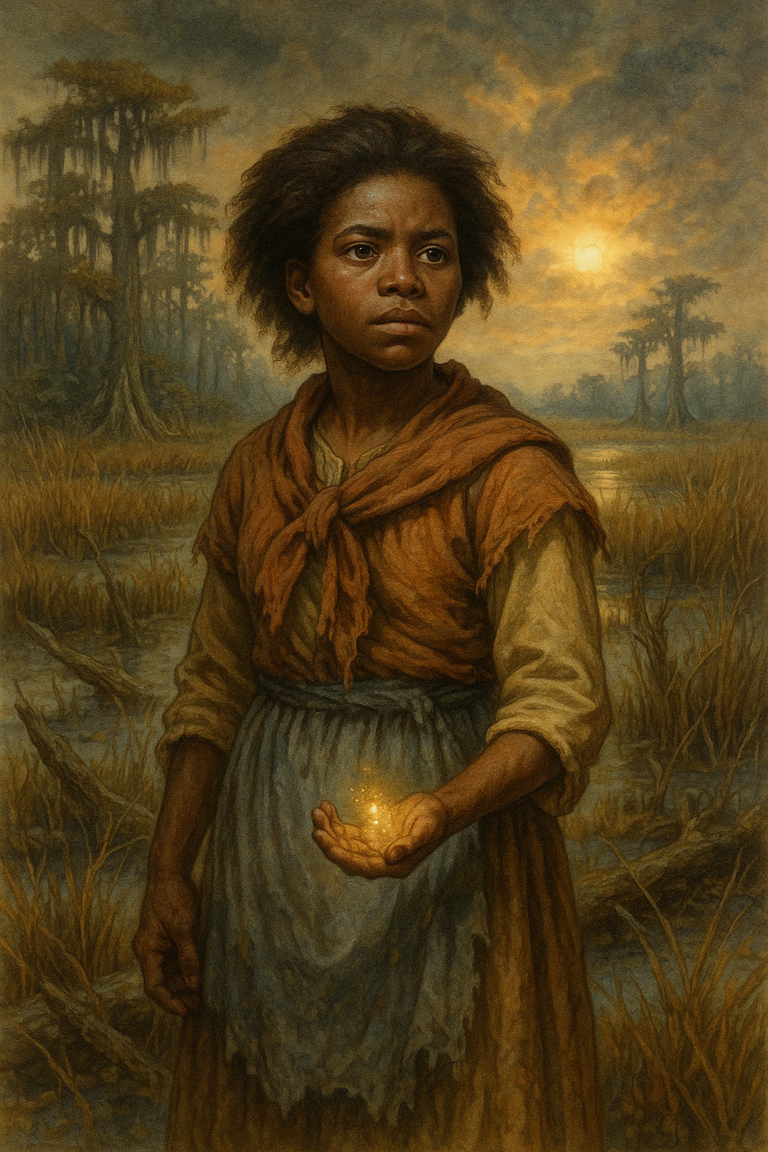
She was not born in the clarity of a precise date. She was not born in a bed, nor under a roof. Araminta Ross, nicknamed Minty, came into the world in the anonymity of the wind, somewhere around 1820, in the stifling swamps of Dorchester County, Maryland. No certificate, no records. Just a birth in silence. One more breath on a plantation that held too many.
Her parents, Benjamin Ross and Harriet Green, were slaves. Their arms fed the wealth of others. Their children did not belong to them. Harriet’s womb bore not the promise of a future, but the threat of a human inventory. In this reversed world, every infant’s cry sounded like a future in chains.
Minty was one of the youngest in a sibling group crushed by the law of cotton and the whip. At the age of seven, she was rented out like a tool. She was sent to even harsher masters, where she cleaned, scrubbed, endured. She had no words yet for pain, but already she knew its paths.
At twelve, she knew her first rebellion. She tried to intervene when an overseer chased another slave. He threw a heavy iron weight at her head. The projectile was not meant for her. The injury was. A fractured skull. Blood. Days of delirium. A trembling body that never fully healed. From that day on, Minty was no longer quite of this world: she drifted in and out of consciousness. She fell, stood again. She saw things others did not.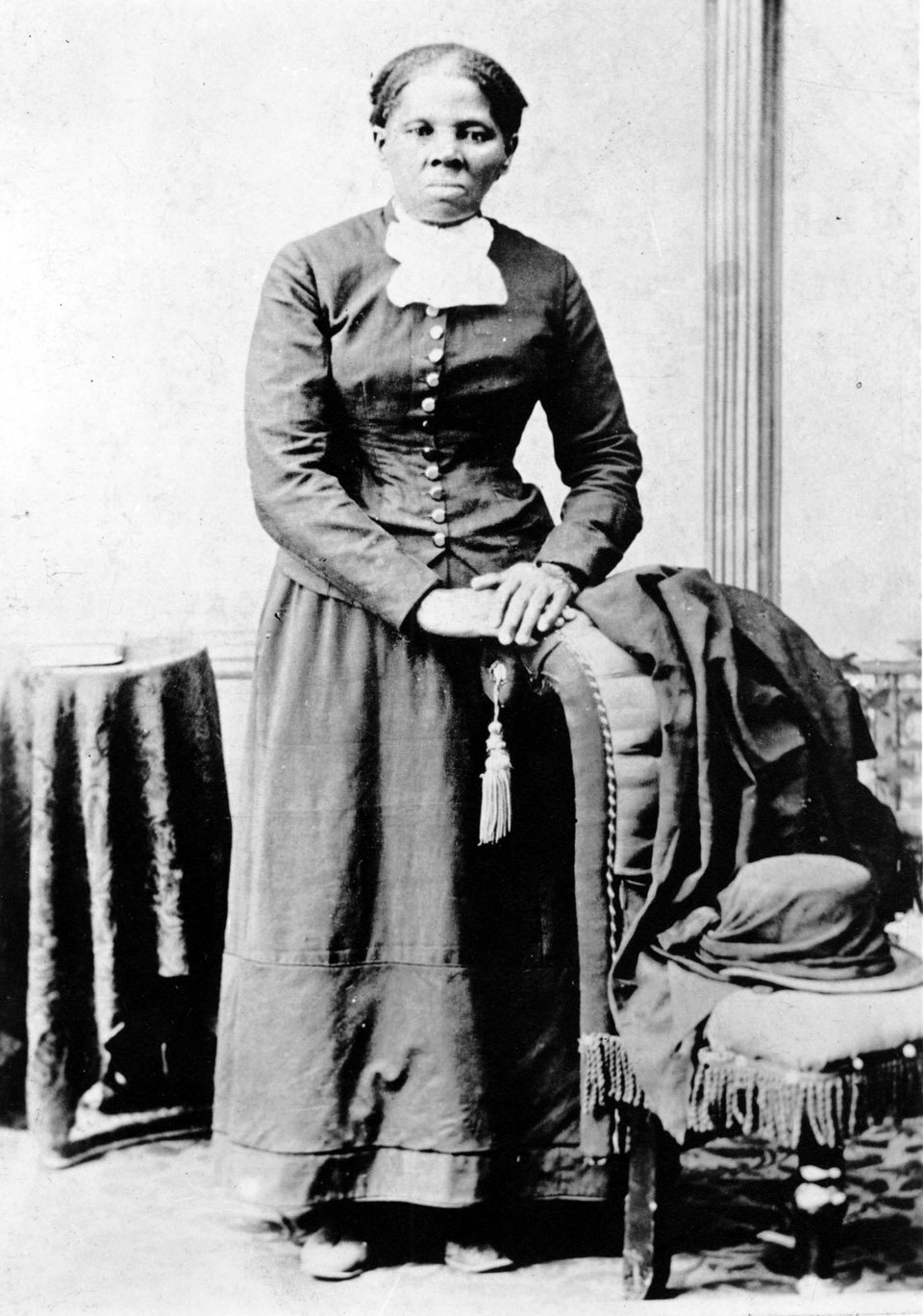
But this fracture opened something else: an inner voice. Visions. Dreams. Callings. Minty said God began speaking to her. Not the God of white masters, but a God of fire and deliverance. A Black God. A free God.
Others thought she was touched. She believed she was chosen.
She didn’t yet know that this pain, this strange light in her head, would be her guiding star. Her wound became oracle. And in the silence of Southern nights, while others slept from exhaustion, she began to dream of hidden paths, damp woods, hands being grabbed and pulled toward escape.
She had done nothing yet. But already, she understood everything: her life would not be lived for herself alone. She was not only born a slave. She was born a bearer of another life. Of a people on the move.
And in the shadows of Maryland, a Black star began to rise.
The escape as birth
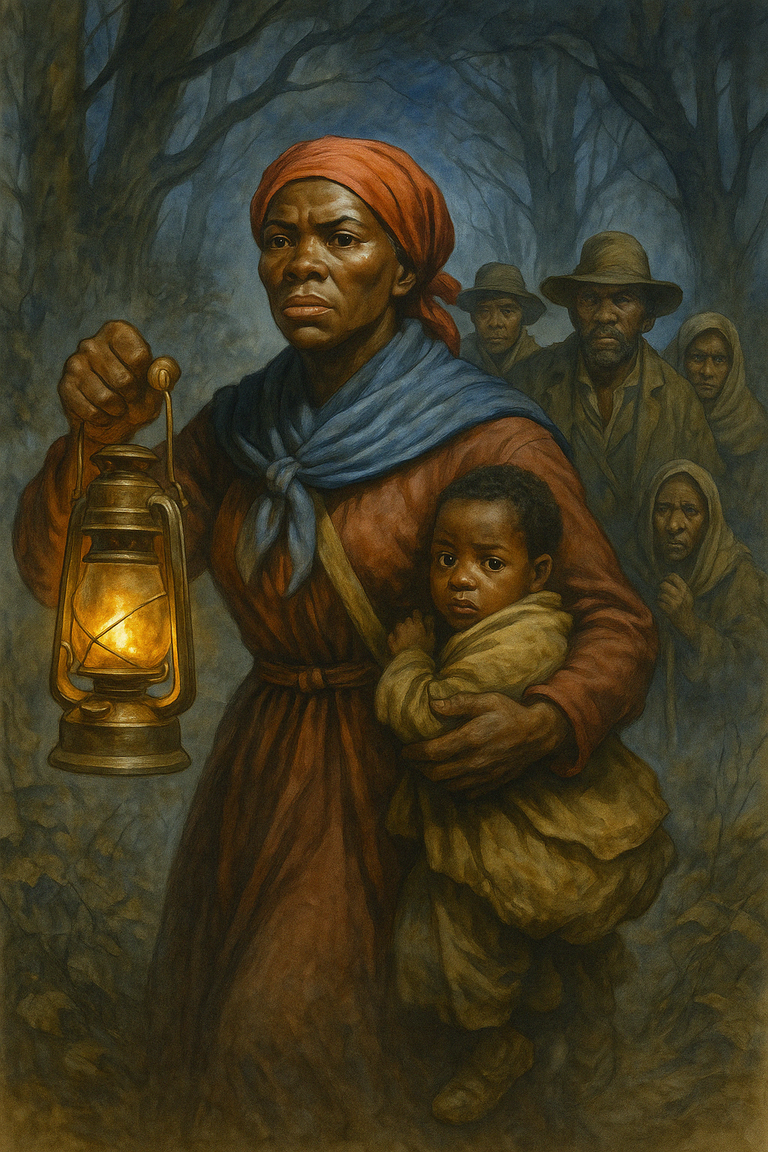
At twenty-five, she changed her name as one chooses a destiny. She became Harriet, in honor of her mother, the one who bore her in pain and submission, and Tubman, her husband’s name, John, a free man who nevertheless refused to follow her. It wasn’t marriage that bound her to him, but the wind of calling, the clarity of departure.
She learned that she was to be sold, as one would sell a horse or a plow. Her body to be auctioned, her bonds severed by the sound of a gavel. Harriet refused this fate. She did not ask for freedom. She took it. One night, without goodbyes, without luggage, she disappeared into the darkness of the South, guided only by the stars and the psalms she sang in silence.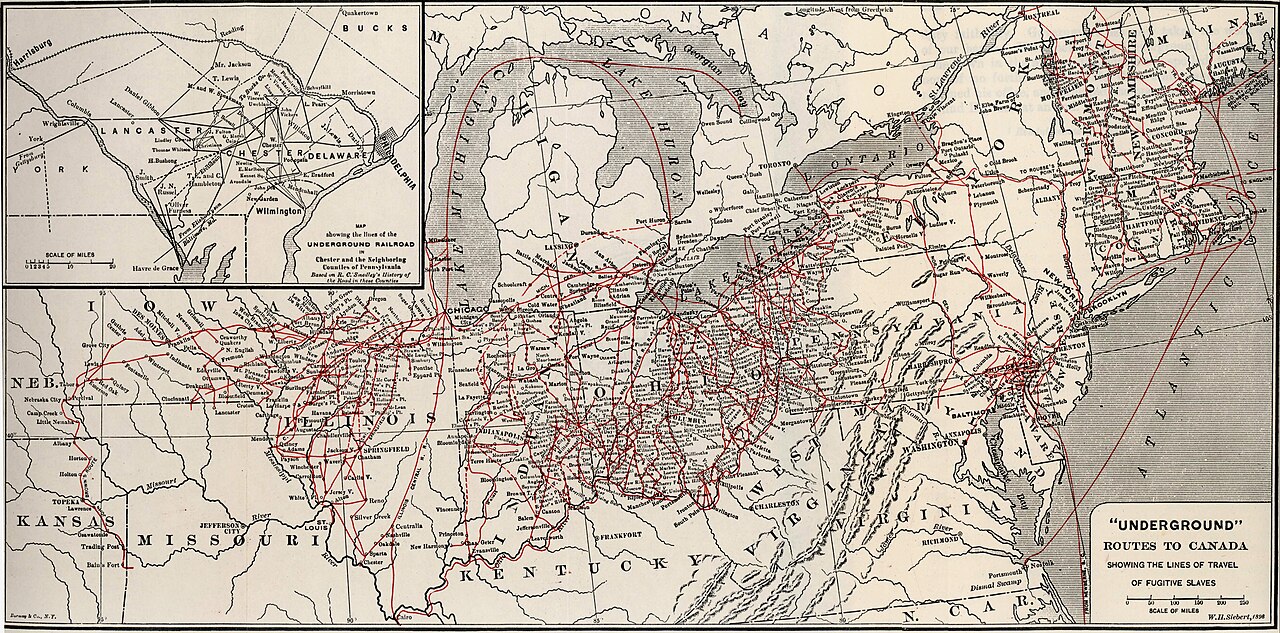
She could not read a map, but she read the sky. She had no weapons, but carried within her an ancient fire, sharper than any blade. She followed the invisible paths of the Underground Railroad, that clandestine web woven by Black and white hands, by fear, hope, and solidarity. Quakers, abolitionists, and unknown allies guided her from one hiding place to another. Sometimes she hid in a cart, sometimes under a blanket, sometimes kneeling in the frozen woods.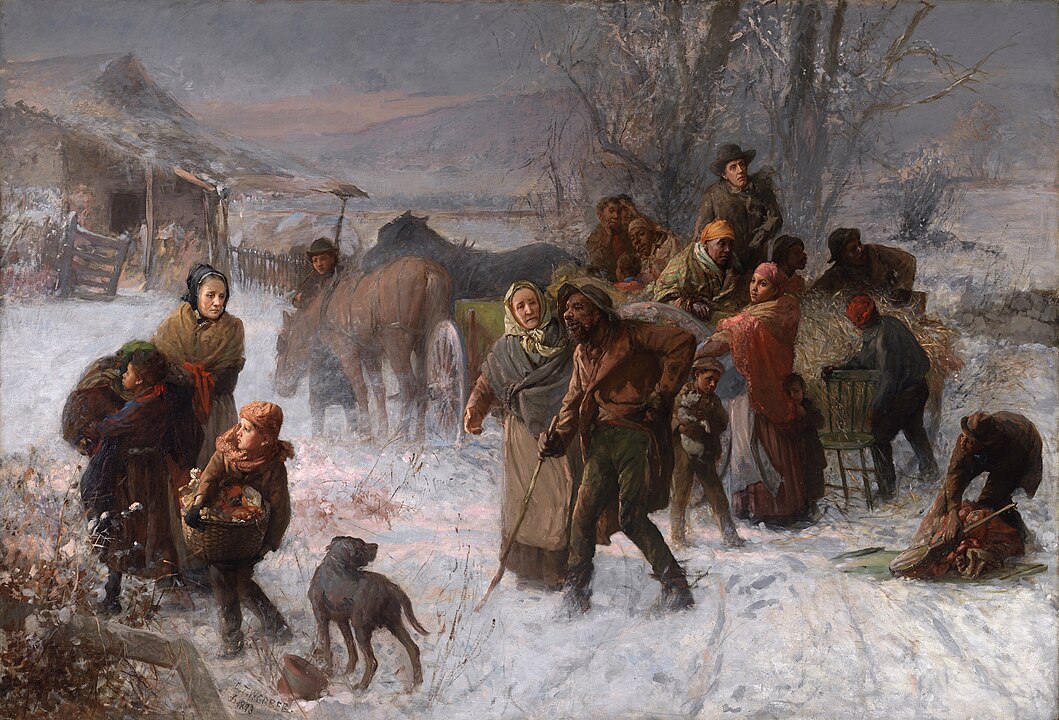
Pennsylvania, where she finally arrived, was a breath of air. The soil there did not judge, the wind there did not insult. She was free. Legally. Spiritually. But solitary freedom had no taste. She looked around her and did not see her brothers, her sisters, her mother, her people.
So she decided to return.
And that’s when her true birth began: not as an escaped slave, but as a liberator.
She crossed the borders nineteen times, as if defying death barehanded. Each return a slap in the face of the established order. Each departure a promise fulfilled. She came back for the others. Not out of duty. Out of love. A love that was neither gentle nor meek. A rough love, brave, incandescent. The love of a woman who refused to live free in a world where her people remained chained.
She carried children in her arms, elders on her back, entire families trembling, hoping, not yet daring to believe. She became a rumor, an elusive shadow. Slave hunters sought her. Slaves prayed for her to come.
She left no tracks. She left broken silences. She left cries that breathed. She left lives pulled from the night.
And each journey, each step in the mud, each hand reached for, added a star to her name. Harriet Tubman was no longer content to be free. She had become the passage itself. An ark. A breath. A living myth.
“You will be free, or dead”
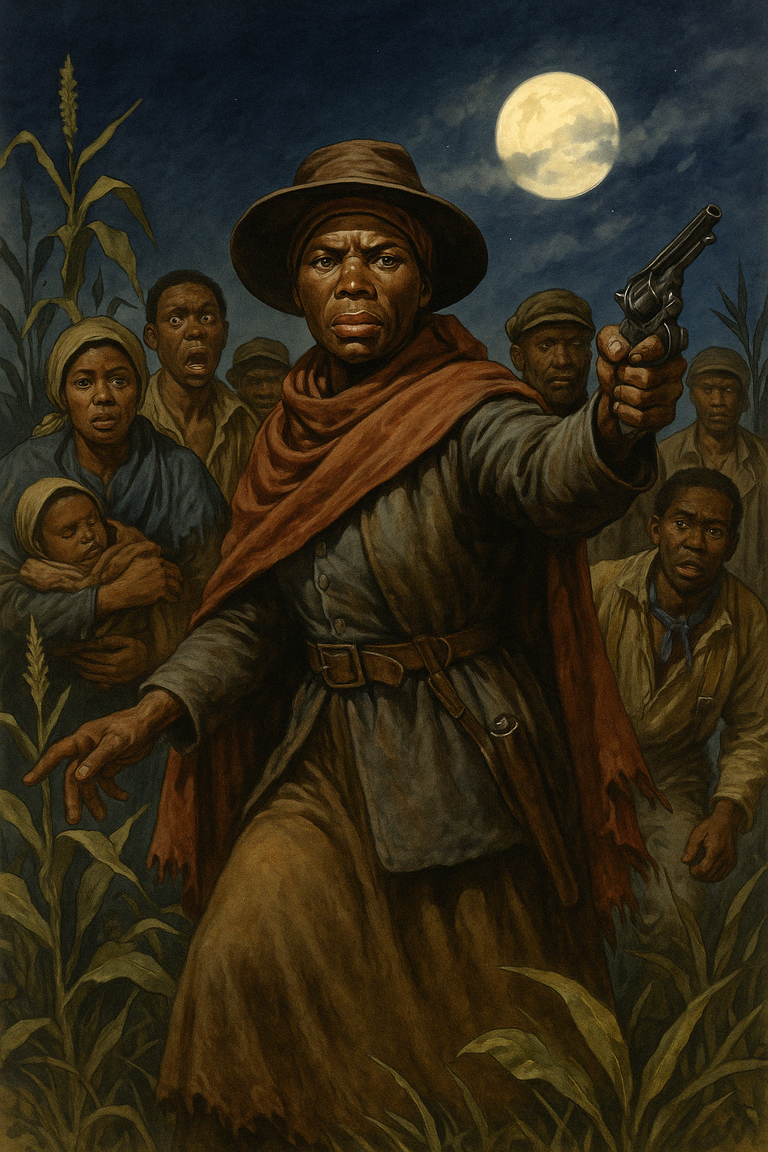
She is often imagined with a shawl on her shoulders and a Bible in hand. But Harriet Tubman is closer to a war commander than a saint. She does not wait for the sky to fall. She acts. She anticipates. She strikes fast. Silently. And always with relentless precision.
Each expedition is a military operation. She never leaves without a plan. She knows the trails, the hideouts, the seasons. She knows that the planters’ newspapers do not publish wanted notices on Sundays. So she always begins on Saturday, like a first note in a fugue toward the North. She gets a head start. She plays with time, bends the calendar to her advantage.
When babies cry, she pulls out crushed herbs, powdered roots, rudimentary mixtures to make them sleep. Not to calm them. To save them. A child’s cry could destroy an entire caravan of hope.
And when an adult hesitates, when legs tremble, when fear wants to turn back, Harriet raises her revolver. Without trembling. She looks into the eyes of the one who hesitates, the one who thinks he can turn back, denounce the others to save himself.
She does not argue. She declares:
“you will go forward. or you will die. but you will not take them down with you.”
It is this determination that makes her invincible. This clarity. No half-freedom. No turning back. No compromise with fear. You cross the river or you die in it. And with her, you choose. Once and for all.
Harriet does not fail. Never. Not a single one of her passengers is recaptured. She saves more than 300 lives. Children, the elderly, couples, pregnant women. Each of them a star she stole from the night.
White masters, humiliated, offer 40,000 dollars for her capture. A colossal sum. But Harriet is untraceable. She is a breath among the branches, a rustle in the corn, a flicker in the darkness. She disappears. She reappears. Just when they think they have her cornered, she’s already somewhere else.
To slave hunters, she becomes a rumor, an obsession, an enigma. To slaves, she is more than a woman. She is living proof that the impossible can be crossed. That a Black woman, uneducated, without an army, without horses or swords, can make an empire bend. Not by striking. By liberating.
And behind her, the chains fall like rain..
Moses in a cotton dress
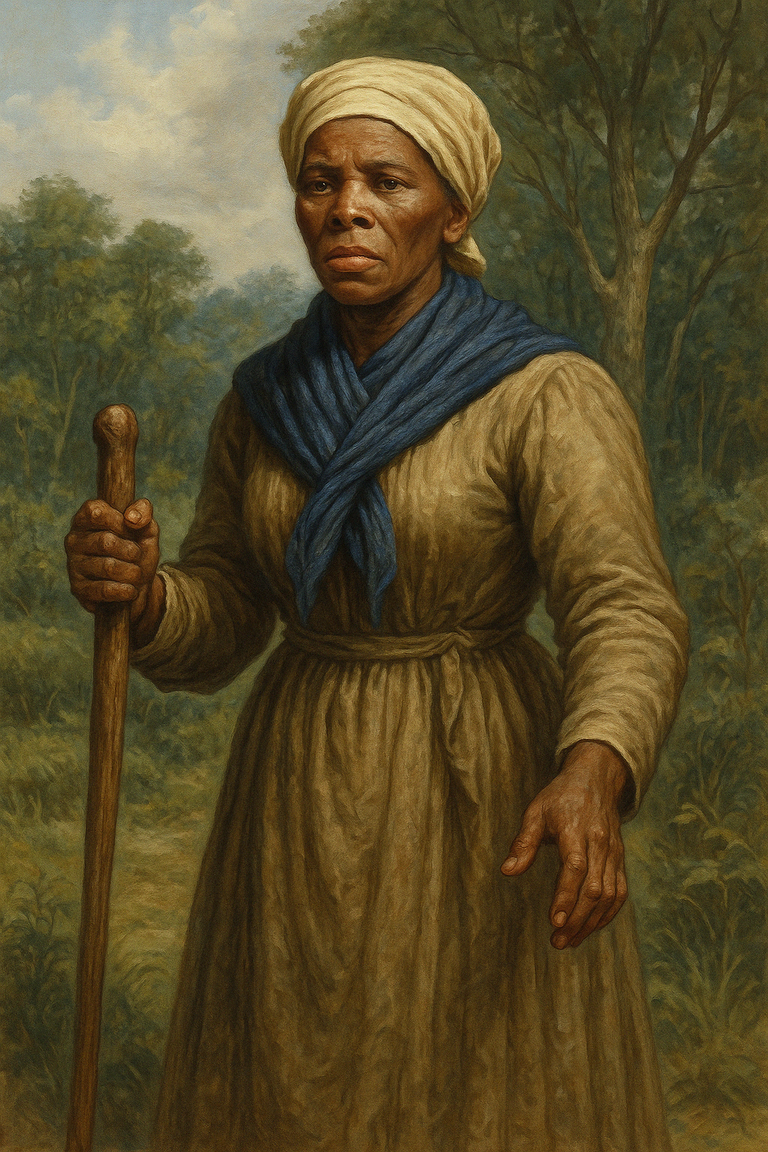
The slaves called her Moses, not because she sought a title, but because she led them across the sea of shadow and whip. She did not part the waters with a staff. She cut through swamps, forests, silences. She had neither tablets of law nor a crown of fire: only a dress of worn cotton, tired arms, a will that nothing could bend.
She did not write. She signed neither tracts nor manifestos. Her name was not printed in abolitionist newspapers. She did not have the words of educated men, but she had the stride of a prophet. The one who walks forward, who leads, who never looks back.
The most eminent figures of Black America recognized her. Frederick Douglass, himself an escapee, writer, formidable orator, admired her in silence:
« you, Harriet, do not speak in salons. you save your people. »
John Brown, the white revolutionary who would be hanged for arming slaves, said of her:
« she is one of the bravest beings America has produced. »
And yet, she demanded neither statues nor salary. She slept where she was welcomed. She ate what she was given. When she wasn’t walking, she healed. She sang. She prayed. And when the wounds were too deep, she laid her hand.
In abolitionist meetings, she did not speak like an intellectual, but like one who had seen the chains up close, who had broken them, who still bore their marks on her skin. Her authority was not theoretical. It was physical. Spiritual. Incarnate.
She did not say “i believe,” she said “i know.”
She knew what freedom cost. She knew the worth of a life pulled from hell. She knew that you do not lead your people with ideas, but with deeds. Bare feet in the mud. A hand stretched out in the dark. A breath that says: follow me.
And they followed her.
Because she did not promise. She delivered.
Because she did not imagine. She acted.
Because she was not born to be a symbol, but a path. A living ark.
And if History had not nicknamed her Moses, it would have ended up stealing her name.
A woman of war, a woman of the future
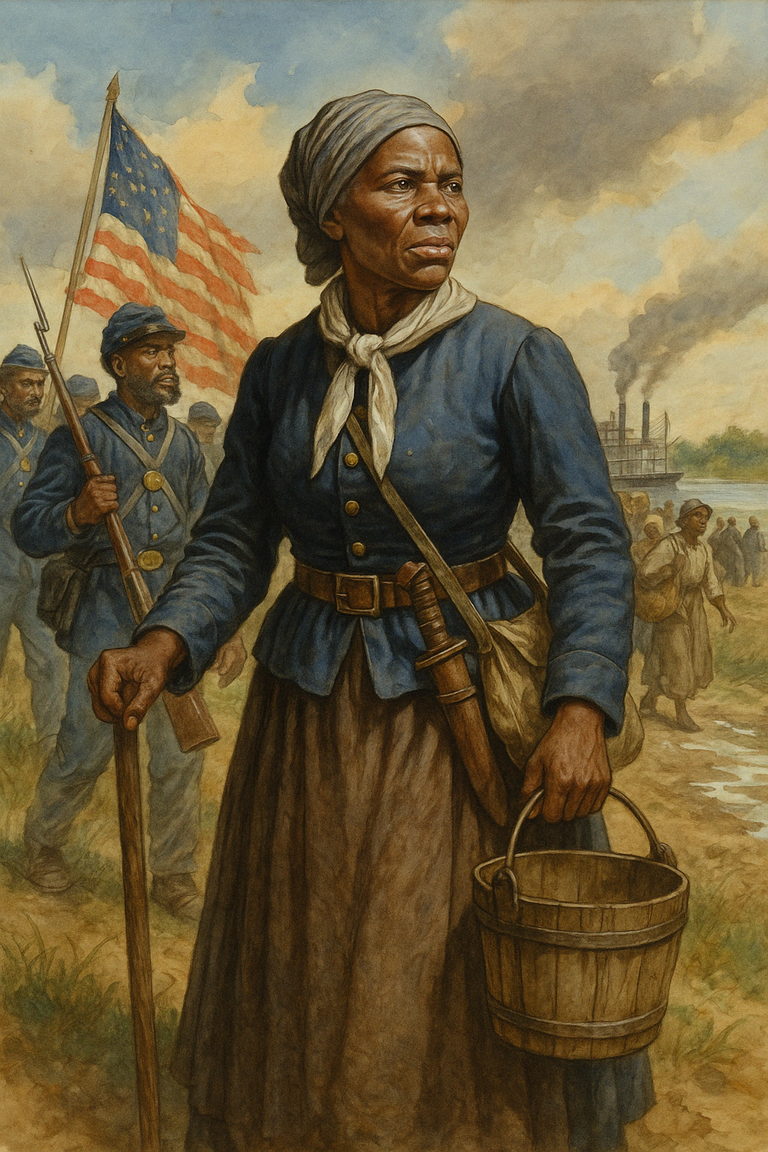
When the Civil War broke out, Harriet Tubman did not stay behind. She did not watch the battles through the curtains of a Northern home, hands clasped in prayer, heart at rest. She put on a makeshift uniform, with no rank or pay, and entered History as she had always lived: by moving forward.
She was a nurse, washing the gangrenous wounds of Black soldiers whom others refused to treat. She was a cook, feeding the starving, gathering bodies and minds. She was above all a spy, slipping through Confederate lines like a wind felt only too late. She deciphered silences, questioned slaves, mapped fortifications. She passed precious information to the Union army.
And then came the raid on the Combahee River, in South Carolina. 1863. Tubman planned it with officers. She guided the troops along the river as she had done so many times for her own. The result: three Northern boats, plantations set ablaze, and more than 700 slaves freed in a single night. A feat. A first. The first Black woman to lead a military operation in United States history.
But the war was only one chapter. She knew that peace, too, required fighters.
She returned to Auburn, in the state of New York. She married Nelson Davis, a former soldier, much younger than she. Not a fairytale marriage, but a pact of life. Together, they opened a refuge for the poor, the elderly, the forgotten. She worked there to the point of exhaustion. She comforted, listened, washed bodies, soothed final days.
She was also an activist. For women. For the right to vote. She spoke at suffragist meetings, standing straight, modest, but unshakeable. When she spoke, it wasn’t words that were heard: it was centuries of erasure that stood tall.
She could have written her memoirs, collected awards, lived in tribute. She never did. She did not seek light. She sought justice. Not for herself, but for all those who would come after.
She never asked to be a heroine. She chose to be useful. In her lifetime, she was often forgotten. Others were paid, decorated. But she—she built the future.
Not with gold. With courage, with toil, with love.
And that future still bears her imprint; in every Black woman standing tall, in every fight for dignity, in every dream of equality that dares still to be believed.
1913: the final crossing
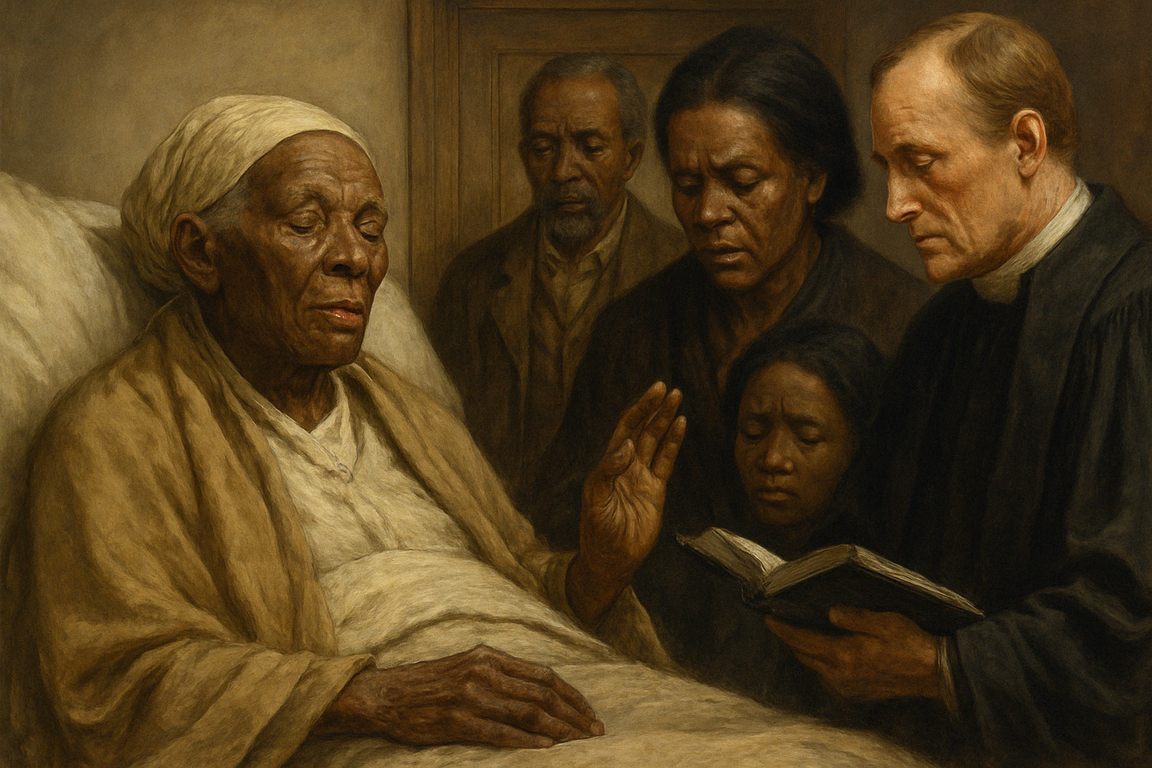
She passed away in march 1913, in a modest home she had built herself—not to die there, but to welcome souls broken by history. In Auburn, in the state of New York, Harriet Tubman left the world as she had traveled through it: quietly, firm in her faith, surrounded by those society had cast aside.
She was old. She was ill. She was poor. But she was rich in every life she had touched. Rich from having freed without counting, healed without resting, loved without fear. She died without official title, without state ceremony. America did not yet know it had just lost a sovereign.
Her final words were a promise:
« i go to prepare a place for you. »
Not a farewell. A ferryman’s phrase. Again. Always. Because even in death, she could not imagine rest without thinking of others.
She left no fortune, no foundation. No grand speeches, no bronze statue erected in her lifetime. But she left a trace. A mark deeper than marble.
She left a name that still burns. Harriet Tubman. A name that cuts through silence. A name children learn in school, that activists carry in the streets, that artists carve into songs, paintings, verses.
Her face, once erased from records, began to reappear everywhere: on school walls, in history books, and soon (as a blazing symbol) on twenty-dollar bills, where once stood the portrait of a slave-owning president.
But beyond the images, her breath remains. A breath of movement, of fire, of dignity. It moves through the struggles against systemic racism, patriarchy, exploitation, amnesia. It lives in the steps of those who reject injustice. It whispers in marches, in prayers, in still-unfinished dreams.
Harriet Tubman is dead. But she is here, in every hand reaching for the far shore.
She is here, every time a voice rises to say no.
She is here, every time a people walks without turning back.
She was not a woman of the past.
She is a woman of the crossing.
And we live, even today, in her wake.
summary
birth of a daughter of earth and fire
the escape as birth
“you will be free, or dead”
moses in a cotton dress
a woman of war, a woman of the future
1913: the final crossing
notes and references
notes and references
Larson, Kate Clifford. Bound for the Promised Land: Harriet Tubman, Portrait of an American Hero, Ballantine Books, 2004.
Clinton, Catherine. Harriet Tubman: The Road to Freedom, Back Bay Books, 2005.
Still, William. The Underground Railroad, 1872.
National Park Service – U.S. Department of the Interior. Harriet Tubman Underground Railroad National Historical Park.
Library of Congress. Harriet Tubman Papers.
Dunbar, Erica Armstrong. She Came to Slay: The Life and Times of Harriet Tubman, 37 Ink, 2019.
New York Times – Overlooked No More: Harriet Tubman.
Documentary: Harriet Tubman: Visions of Freedom, PBS / American Experience, directed by Stanley Nelson, 2022.
BlackPast.org – Tubman, Harriet (c. 1820–1913)
National Women’s History Museum. Harriet Tubman Biography.
